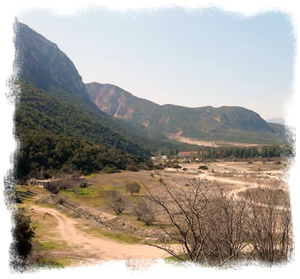
 |
| MAIN |
| Introduction |
| Greek Preparations |
| Armies |
| Battlefield |
| Battle |
| Aftermath |
| Date |
| Monuments |
| COMPLEMENTARY |
| Thermopylae |
| Leonidas I |
| Xerxes I |
| Sparta |
| Thespiae |
| Molon Labe |
| Greek
Preparations |
|
|
After the expedition to Greece had got under way, Xerxes sent messengers to all Greek cities offering blandishments if they would submit, and asking for "earth and water" from their soil as a token of their submission. Many smaller states submitted. However, the Athenians threw their envoys into a pit and the Spartans threw theirs into a well, taunting them with the retort, "Dig it out for yourselves" (referring to the 'earth and water' demand). Support gathered around these two leading states. A congress met at Corinth in late autumn of 481 BC and a confederate alliance of Greek city-states was formed. It had the power to send envoys asking for assistance and to dispatch troops from the member states to defensive points after joint consultation. There is no evidence that any one state was in charge. Herodotus calls them simply "the Greeks" or "the Greeks who had banded together." The interests of all the states played a part in determining defensive strategy. Nothing else is known about the internal workings of the congress or the discussion during its proceedings. The Persian army first encountered a joint force of 10,000 Athenian and Spartan hoplites led by Euanetus and Themistocles in the vale of Tempe. Upon hearing this, Xerxes sent the army through the Sarantaporo strait, which was unguarded, and sidestepped them. The hoplites, warned by Alexander I of Macedon, vacated the pass. The allied Greeks judged that the next strategic choke point where the Persian army could be stopped was Thermopylae. They decided to defend it and send a fleet to Artemision, a naval choke point, as Xerxes' army was being supplied and supported by sea. Using the fleet, Xerxes' army might have crossed Maliacos bay and outflanked the Greek army again.
The Greek high strategy is confirmed by an oration later in the same century: But while Greece showed these inclinations (to join the Persians), the Athenians, for their part, embarked in their ships and hastened to the defence of Artemisium; while the Spartans and some of their allies went off to make a stand at Thermopylae, judging that the narrowness of the ground would enable them to secure the passage. Some modern historians, such as Bengtson, claim that the purpose of the land force was to slow down the Persian army while the Persian navy was defeated at sea. Another theory is that the land army was expected to hold back the Persian forces in the north and defeat it through attrition, epidemics, and food deprivation. Some have argued that the Athenians were confident that a small force led by Leonidas would be enough to hold back the Persians; otherwise, they would have already vacated their city and sent their whole army to Thermopylae. There is one known case in which a small force did stop a larger invading force from the north: in 353 BC/352 BC the Athenians managed to stop the forces of Philip II of Macedon by deploying 5,000 hoplites and 400 horsemen. Herodotus writes: "The force with Leonidas was sent forward by the Spartans in advance of their main body, that the sight of them might encourage the allies to fight, and hinder them from going over to the Medes, as was likely they might have done had they seen that Sparta was backward. They intended presently, when they had celebrated the Carneian Festival, which was what now kept them at home, to leave a garrison in Sparta, and hasten in full force to join the army. The rest of the allies intended to act similarly; for it happened that the Olympic Festival fell exactly at this same period. None of them looked to see the contest at Thermopylae decided so speedily; wherefore they were content to send forward a mere advance guard. Such accordingly were the intentions of the allies." The legend of Thermopylae as told by Herodotus has it that Sparta consulted the Oracle at Delphi before setting out to meet the Persian army. The Oracle is said to have made the following prophecy in hexameter verse : "O ye men who dwell in the streets
of broad Lacedaemon! In essence, the Oracle's warning was that either Sparta would be conquered and left in ruins or one of her two hereditary kings, descendant of Hercules, must sacrifice his life to defend her. Leonidas took charge of his personal fighting unit, the 300 Spartans, and headed to Thermopylae. Herodotus writes that Leonidas was idolized by his men. He was convinced that he was going to certain death and his forces were not adequate for a victory, and so selected only men who had fathered sons who were old enough to take over the family responsibilities. Plutarch mentions in his Sayings of Spartan Women that, after encouraging him, Leonidas's wife Gorgo asked what she should do on his departure. He replied, "Marry a good man, and have good children."
Permission is granted to copy, distribute and/or modify this article under the terms of the GNU Free Documentation License, Version 1.2 or any later version published by the Free Software Foundation.
(What does it mean?)
The text is based on material from the Wikipedia article "Battle of Thermopylae". Modifications, additions to the Wikipedia text and all the photos by the website author. |
